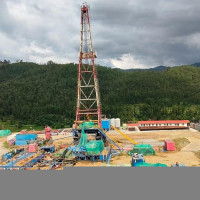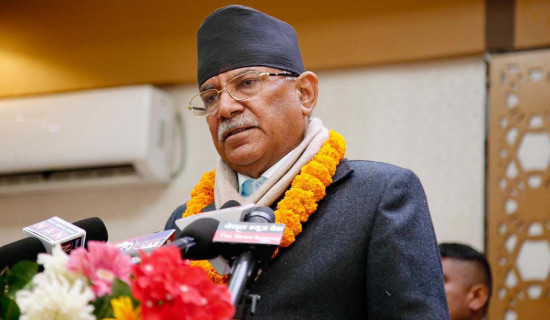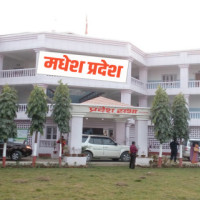- Friday, 13 February 2026
Minister Bhusal stresses use of technology in agriculture sector
By Laxman Kafle,Kathmandu, July 1: Farmers across the country observed the 20th National Paddy Day and paddy festival by planting paddy and savouring Dahi Chiura (curd and beaten rice) on Friday.
The theme of the 20th National Paddy Day was ‘Climate resilient farmers’ friendly technology for increasing rice production’.
The Day is marked on the 15th day of the Nepali month of Asar every year. The rice festival is celebrated in different ways depending on the part of the country. Singing, dancing, playing with mud and enjoying good food like curd and beaten rice are form the core parts of the festivities. Asar is popularly known as ‘mano ropera muri ubjaune’ (growing more by sowing less) time.
A central-level formal programme was organised by the Ministry of Agriculture and Livestock Development, Department of Agriculture and Nepal Agriculture Research Council at Khumaltar, Lalitpur to mark the day in the presence of Minister for Agriculture and Livestock Development Dr. Bedu Ram Bhusal.
On the occasion, Minster Dr. Bhusal planted paddy using modern agricultural inputs and hands. Many government officials, farmers from the Kathmandu Valley and paddy experts and others attended the programme.
Inaugurating the Paddy Day function, Minister Dr. Bhusal stressed the need for using advanced technologies for the increment of production and productivity of agricultural crops, especially paddy.
“Increasing fragmentation of land and plotting of fertile land is affecting agricultural production, so we should focus on land consolidation and promote agriculture to make the country self-reliant in agricultural produce,” he said.
He said that the land was being left barren as many people started moving to the urban areas from the village and increasing overseas migration of youth as well as the damages caused to the crops by the wild animals.
He said that the government has forwarded the plan to use barren land for agriculture activities to make the country self-sufficient in food and to develop the agricultural sector, which is considered the backbone of the economy.
Similarly, the improved varieties of seeds and climate resilient farmer-friendly technologies are equally important to increase production and productivity of paddy and other crops, he said.
No shortage of chemical fertiliser
Minister Dr. Bhusal claimed that there would be no shortage of chemical fertilisers in the paddy planation season this year.
“Around 78,000 tonnes of chemical fertilisers is in the stock of Agriculture Inputs Company and Salt Trading Corporation at present. Around 45,000 tonnes is in the process to enter by mid-July and 75,000 tonnes by mid-August. I want to assure farmers that there will be no scarcity of chemical fertilisers this year,” he said.
He, however, said that there were some problems in the distribution of chemical fertilisers somewhere. The Ministry has already directed the concerned authorities to monitor and take action if any malpractice is found in fertiliser distribution.
Secretary at the Ministry of Agriculture and Livestock Development Deepak Kumar Kharel stressed the need to focus on using modern technologies and promoting Chaite paddy plantation to increase production and fill the gap between demand and production of paddy.
Executive Director of NARC (Nepal Agricultural Research Council) Dhruba Raj Bhattarai said that the NARC was preparing to run a ‘research campaign’ from the next fiscal year with the aim to make the country self-reliant in paddy and other agricultural crops.
He said that the NARC has been focusing on research to introduce new varieties of paddy to increase productivity and production.
Director General of the Department of Agriculture Dr. Hari Bahadur KC said that the productivity of paddy has been increasing over the years due to the growing use of technologies and improved seeds.
He stressed the need for management of sustainable irrigation facilities, easy supply of chemical fertilisers and improved seeds for increased production and productivity.
According to him, paddy plantation activities have been going on across the country.
The plantation has completed around 11 per cent of the total paddy field across the country so far, with Karnali and Sudurpashchim provinces seeing the highest plantation.
Plantation at 70% in Baitadi According to our Baitadi Correspondent, about 70 per cent plantation has been completed in Baitadi.
Narendra Bahadur Chand, Agricultural Extension Officer of Agriculture Knowledge Centre, Baitadi, said that paddy plantation has completed in 70 per cent of land where irrigation facilities are available by Friday.
Paddy is cultivated in around 9,000 hectares of land in 10 local levels of Baitadi.
Only 40 per cent of the paddy cultivation areas has irrigation facilities. Where there is no irrigation facility, plantation depend on rain water.
The paddy plantation was started in Baitadi from the last week of the month of Jestha. Patan of the Patan Municipality, Sera in Dasharathchand Municipality, Gokuleshwar area in Dilasaini Municipality, Dhungad area in Sigas Rural Muicipality, Salena in Melauli, area connected to Mahakali in Pancheswar, area connected to Mahakali in Dasharathchand Municipality and area connected to Surnaya river in Surnaya are considered rice pocket areas.
Although modern agricultural equipment has been used for paddy planting in the district, in many places oxen have been used. As the local government gives no priority to the agricultural sector, the farmers are planting traditionally.
Birendra Chand of Melauli Municipality said that after an oxen died of lumpy skin disease in Baitadi this year, the farmers who traditionally plowed the fields with oxen were in trouble.
Around 18,000 tonnes of paddy is produced in Baitadi annually.















